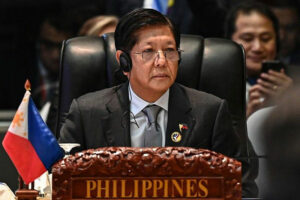
Marcos touts potential of Philippine chemical industry
PRESIDENT Ferdinand R. Marcos, Jr. solicited potential investors in the Philippines’ chemical industry, particularly projects involving materials needed for the green transition.
“One of the largest sub-sectors in our manufacturing industry is the chemicals industry,” he was quoted as saying at the ASEAN Business and Investment Summit in Laos, according to a transcript released by his office on Thursday.
“This is what we consider a pillar industry as it supports the agriculture, automotive, cement, creative, construction, energy, health, and pharmaceutical sectors.”
Mr. Marcos said the chemical industry is considered a “major contributor to economic growth and job generation in the foreseeable future.”
Gross value added generated from chemical and chemical products hit P461 billion in 2023, down from P465.1 billion a year earlier, according to Statista.
“Our manufacturing sector continues to flourish despite global challenges. Indicators such as the sustained growth in the Purchasing Managers’ Index proves that with a strong foundation, industries can flourish even in these uncertain times,” Mr. Marcos said.
Manufacturing registered growth of 3.6% in the second quarter, due in large part to production of coke and refined petroleum products, food products, chemical and chemical products, printing and reproduction of recorded media, and electrical equipment, according to the Philippine Statistics Authority.
Mr. Marcos said the Philippines has stepped up its efforts to become “an ideal hub for smart, sustainable manufacturing,” citing the establishment of its first factory for the manufacturing of advanced lithium iron phosphate batteries.
“We are targeting industries like green metals, battery manufacturing, energy equipment, data centers, and agribusiness,” he said.
He was referring to Australian investor StB GigaFactory, Inc.’s newly built battery manufacturing plant at Filinvest Innovation Park at New Clark City in Tarlac, which is expected to create about 2,500 direct and indirect jobs in the engineering, technical, finance, and administrative fields by 2030.
The hub, with capacity of 6,000 electric vehicle batteries or 60,000 home battery systems each year, is expected to contribute over P5 billion annually to the economy.
Between July 2022 and April 2024, 13 renewable energy projects in solar, hydropower, and biomass have been completed and “more are in the pipeline,” Mr. Marcos said.
He also cited recent economic reforms, in addition to which Congress is expected to pass a bill soon to further cut the corporate income tax (CIT) to 20% from 25%.
A previous law signed in 2021 cut CIT to 25% from 30%.
Also in Laos, Mr. Marcos and other members of the Philippine delegation met with executives of foreign companies including Thailand’s SHERA Public Co. Ltd.
Executives including Chief Executive Officer (CEO) Ongek Taechamahaphant and Philippine Country Head Thunnop Jumpasri discussed the installation and operation of a fiber cement building materials plant inside TECO Industrial Park in Mabalacat City, Pampanga.
The P2.9-billion project is expected to begin operations by the first quarter of 2025, marking SHERA’s first overseas venture, Malacañang said in a statement.
SHERA is one of the world’s largest manufacturers of fiber cement boards, siding, roofing and concrete roof tiles. — Kyle Aristophere T. Atienza



